The bigger they are, the harder they fall. The greater the position, the stronger are the consequences of errors. The status of primacy can become a temptation, when the word of Christ is forgotten: But many that are first shall be last; (Matthew 19:30), for every one that exalteth himself shall be abased (Luke 18:14).
Constantinople, Constantinople! A city of great saints, and great heretics; a city that has known the glory of the Orthodox Empire, and experienced the shame of ruin, and the miserable subjugation to the sons of the Ottomans. Your contribution to history is invaluable: you turned nations and empires to Christ, you were distinguished by unsurpassed holy theologians, whose works are a model of faith for all of us. But within your borders were also born heresies, and thanks to you, troubles came.
You, once an Imperial City, drove out two of your greatest Holy Hierarchs—Gregory the Theologian and John Chrysostom; both had no place within your illustrious walls. You had Nestor[1] as your primate, and you knew Eutyches[2] as an influential abbot of a monastery, and mentor of high persons and courtiers.
Within you, O Constantinople, the destinies of the nations were intertwined, there were struggles in you, and in you they argued about the fine points of the faith: The Holy Emperor Justinian composed the hymn “O Only Begotten Son, and Immortal Word of God”[3], and likewise the heretical emperor Anastasius added the monophyte addition “who was crucified for us” into the Trisagion.
Within the bounds of your Empire, vast heresies were born which divided Christians, and your Emperors could not overcome these tragic sunderings. You denounced the errors of Catholicism, and then later you conducted a Unia with them, trying to be saved from the sword of the Muslims.
Within you truth conquered, but with God’s allowance, it’s opposite also overcame; not every word of yours is an expression of truth, and not all that you speak is infallible and without error.
Your sword, the heir of the victorious Roman gladius[4] did not withstand Zulfiqar—the double-bladed sword of Mohammed[5]. Your sons slavishly filled the ranks of the Janissaries[6], and in place of the spiritual and majestic domes of your churches, the sharp points of the minarets of mosques arose.
You were betrayed into the hands of Muslims, underwent ruin, and lost your very name, becoming Istanbul, having lost the opportunity for clear preaching among those of different religions, within your own boundaries. Now your flock is scattered all across the world, like nestlings without a nest, like children without shelter.
You know well what the grief and sorrow of separation feels like, the pain of cutting children off from their mother. Why do you bring this same pain on others?
Why are you trying to cut off from the Mother Church the children who are dear to her heart? Why do you contribute to the gathering of storm-clouds, thickening over the heads of our brothers and sisters, whose loyalty to the canonical Church is alike the podvig [feat] of the martyrs, who are ready to suffer, but not to renounce, to endure torture, but not flee from the shelter of their dear native church?
A Time of Troubles is a test. In any trouble, a blow from those whom we thought of as friends, and allies, and like-minded people is especially painful. The one who supports an enemy is a traitor. The stab of a traitor comes always in the back, and is therefore especially bitter.
But with us is The One, who will not betray, who will not deceive, and who will not fail—Our Lord and Savior. History is an intertwining of human contrariety, infirmities, and sins, but it’s not an uncontrollable process; we are not abandoned by God’s providence.
And when nightfall is gathering around Holy Rus’, and birds of prey are hungering for the bodies of those fallen on the battlefield, the Lord gave his gracious help—the Strength of God makes perfect in our weakness. (cf. 2 Corinthians 12:9). And therefore, Russia will remain standing. What should we fear for our enemies if God Himself is with us?
When a person wishes to listen, he hears. Our thirst for unity, the desire of our heart is not yet heard. We have been eager for unity since the beginning of the 1990s, when we were divided into different states. We crave for the unity of the spiritual nature—they are trying to divide us, and now, they want to tear the living body of the church into portions, to shed blood, because always, when a living organism is dissected, blood is shed, and pain permeates throughout the whole body. But the voices of our hearts have still not yet been heard.
But even when people do not want to hear us, God always hearts us—to Him we turn our prayers, supplications, and tearful petitions. He helps when nobody, and nothing else can. He raises the dead, heals the sick, returns the lost, and saves those who have perished.
The time allotted to us is filled with destiny.[7] The future of Holy Rus’ is in the making. This future also depends on us, our prayers, our heartfelt petitions, and our active participation in supporting unity.
May division never prevail—the deeds of the one who divides, in order to rule over those who are divided. May the Savior’s high priestly prayer be fulfilled:
“That they all may be one; as Thou, Father, art in Me, and I in Thee, that they also may be one in Us…that the love wherewith Thou hast loved Me may be in them, and I in them” (John 17:21:26).
O God, do not allow the cutting [schism] of the body of Your Holy Church!
O Defend from plundering, Your flock!
So that Love will not become scarce in our hearts, but a pledge of unity with You, and union with our neighbors!
Amen!


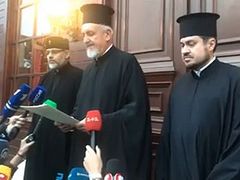
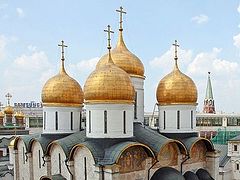
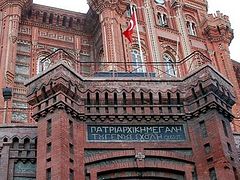
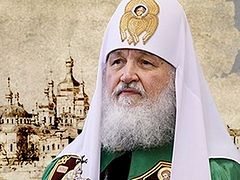
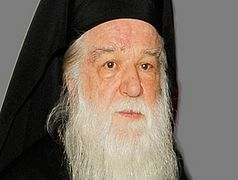
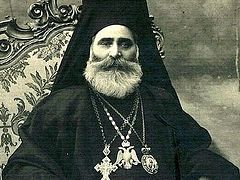
Dear Fr. Valery--
AXIOS!
Beautifully said.
with you in Christ,
Fr. James+
St. Joseph of Arimathea Orthodox Church
and House of Prayer
)ROCOR Western Rite)